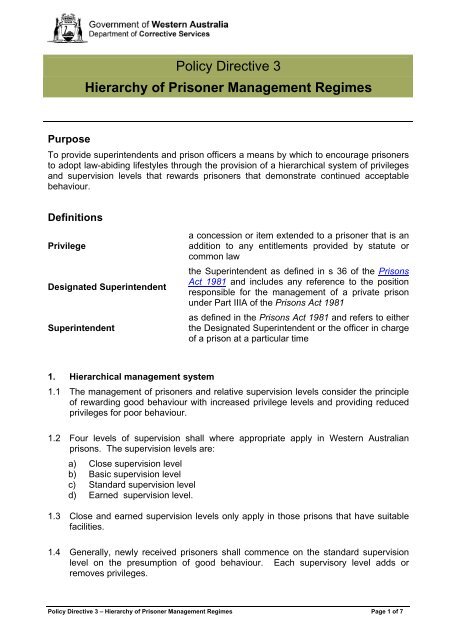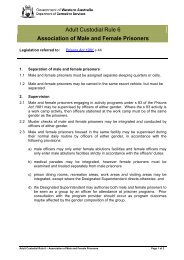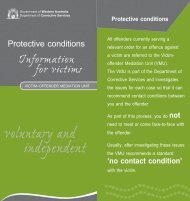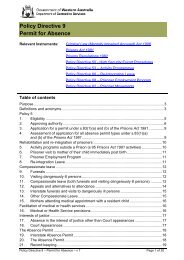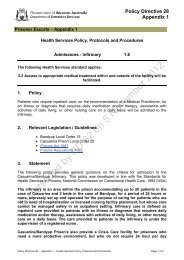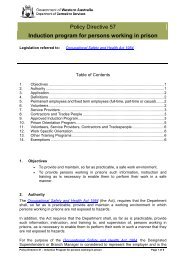Policy Directive 3 – Hierarchy of Prisoner Management Regimes
Policy Directive 3 – Hierarchy of Prisoner Management Regimes
Policy Directive 3 – Hierarchy of Prisoner Management Regimes
Create successful ePaper yourself
Turn your PDF publications into a flip-book with our unique Google optimized e-Paper software.
<strong>Policy</strong> <strong>Directive</strong> 3<br />
<strong>Hierarchy</strong> <strong>of</strong> <strong>Prisoner</strong> <strong>Management</strong> <strong>Regimes</strong><br />
Purpose<br />
To provide superintendents and prison <strong>of</strong>ficers a means by which to encourage prisoners<br />
to adopt law-abiding lifestyles through the provision <strong>of</strong> a hierarchical system <strong>of</strong> privileges<br />
and supervision levels that rewards prisoners that demonstrate continued acceptable<br />
behaviour.<br />
Definitions<br />
Privilege<br />
Designated Superintendent<br />
Superintendent<br />
a concession or item extended to a prisoner that is an<br />
addition to any entitlements provided by statute or<br />
common law<br />
the Superintendent as defined in s 36 <strong>of</strong> the Prisons<br />
Act 1981 and includes any reference to the position<br />
responsible for the management <strong>of</strong> a private prison<br />
under Part IIIA <strong>of</strong> the Prisons Act 1981<br />
as defined in the Prisons Act 1981 and refers to either<br />
the Designated Superintendent or the <strong>of</strong>ficer in charge<br />
<strong>of</strong> a prison at a particular time<br />
1. Hierarchical management system<br />
1.1 The management <strong>of</strong> prisoners and relative supervision levels consider the principle<br />
<strong>of</strong> rewarding good behaviour with increased privilege levels and providing reduced<br />
privileges for poor behaviour.<br />
1.2 Four levels <strong>of</strong> supervision shall where appropriate apply in Western Australian<br />
prisons. The supervision levels are:<br />
a) Close supervision level<br />
b) Basic supervision level<br />
c) Standard supervision level<br />
d) Earned supervision level.<br />
1.3 Close and earned supervision levels only apply in those prisons that have suitable<br />
facilities.<br />
1.4 Generally, newly received prisoners shall commence on the standard supervision<br />
level on the presumption <strong>of</strong> good behaviour. Each supervisory level adds or<br />
removes privileges.<br />
<strong>Policy</strong> <strong>Directive</strong> 3 <strong>–</strong> <strong>Hierarchy</strong> <strong>of</strong> <strong>Prisoner</strong> <strong>Management</strong> <strong>Regimes</strong> Page 1 <strong>of</strong> 7
2. Entitlements and privileges<br />
2.1 This directive does not affect the rights <strong>of</strong> prisoners afforded under the Prisons Act<br />
1981 and Prison Regulations 1982, nor any minimum entitlements established<br />
under other written law or written instructions.<br />
2.2 There shall be a direct correlation between the privileges the superintendent shall<br />
make available, the behaviour displayed by a prisoner and the level <strong>of</strong> supervision<br />
required in conjunction with Adult Custodial Rule 3.<br />
3. Progression and regression<br />
3.1 The system shall reward good behaviour by progression to or eligibility to progress<br />
to a higher level <strong>of</strong> privileges and lower level <strong>of</strong> supervision.<br />
3.2 In contrast, poor behaviour shall result in regression to a lower level <strong>of</strong> privileges<br />
and a higher level <strong>of</strong> supervision.<br />
3.3 Progression and regression through supervision levels involves the management <strong>of</strong><br />
prisoner privileges and should not impinge on the rights (minimum entitlements) a<br />
prisoner has under the Prisons Act 1981, Prisons Regulations 1982 or any other law.<br />
3.4 Regression may involve the suspension or losing <strong>of</strong> selected privileges applicable to<br />
a prisoner’s current level or an overall reduction to a higher supervision level in the<br />
hierarchical management system.<br />
4. Hierarchical prisoner management and punishment<br />
4.1 The purpose <strong>of</strong> basic and close supervision is not intended as a punishment or as<br />
part <strong>of</strong> a punishment, but provides for the management <strong>of</strong> prisoners that do not<br />
demonstrate personal responsibility (acceptable behaviour) or do not actively<br />
participate in employment and/or program activities.<br />
4.2 <strong>Prisoner</strong>s that complete a period <strong>of</strong> separate confinement imposed following<br />
conviction for a prison <strong>of</strong>fence are to be returned to basic or standard supervision<br />
level, unless their behaviour requires the placement at close supervision in<br />
accordance with the criteria for that level <strong>of</strong> supervision.<br />
5. Establishing a hierarchy system<br />
5.1 The Designated Superintendent shall establish the supervisory levels that apply in<br />
that prison and the process for progression or regression through the relevant<br />
levels.<br />
5.2 The Designated Superintendent shall establish the application and approval<br />
processes that apply in that prison for prisoners wishing to progress to the earned<br />
supervision level.<br />
<strong>Policy</strong> <strong>Directive</strong> 3 <strong>–</strong> <strong>Hierarchy</strong> <strong>of</strong> <strong>Prisoner</strong> <strong>Management</strong> <strong>Regimes</strong> Page 2 <strong>of</strong> 7
5.3 The Designated Superintendent shall specify the privileges that apply to differing<br />
supervision levels in their prison.<br />
5.4 The information referred to in 5.1.to 5.3 is to be made available to prisoners at<br />
reception into a prison, or on request.<br />
6. Standard <strong>of</strong> behaviour<br />
6.1 The Designated Superintendent shall establish the general standard <strong>of</strong> behaviour<br />
expected <strong>of</strong> prisoners at that prison.<br />
7. Close Supervision Level<br />
Approval<br />
7.1 The placement and removal <strong>of</strong> prisoners into or out <strong>of</strong> this supervisory level is<br />
subject to the approval <strong>of</strong> the Designated Superintendent or their delegate.<br />
Reason for placement<br />
7.2 Close supervision is a management option to maintain the good order and security<br />
<strong>of</strong> a prison. The purpose <strong>of</strong> close supervision is not intended as a punishment or as<br />
part <strong>of</strong> a punishment.<br />
7.3 Once placed at close supervision, the prisoner shall remain at that level until the<br />
reason for placement at close supervision is no longer relevant or the prisoner<br />
displays behaviour suitable for placement at basic or standard supervision levels.<br />
7.4 The purpose is to temporarily remove those prisoners from the mainstream prison<br />
population because they pose a threat to other prisoners, staff or the good order<br />
and security <strong>of</strong> the prison, and require a greater degree <strong>of</strong> supervision and<br />
management than other prisoners require.<br />
7.5 Conduct that may require a <strong>Prisoner</strong>’s placement under close supervision shall<br />
reflect continued acts <strong>of</strong> violence, serious non-conformist behaviour or behaviour<br />
that poses a threat to the good order and security <strong>of</strong> the prison. These are the only<br />
factors considered for placing a prisoner under close supervision.<br />
7.6 <strong>Prisoner</strong>s who come within this category would jeopardise the security and good<br />
order <strong>of</strong> the prison if they continue association with the general prison population,<br />
but prisons are able to manage them with other prisoners who also require a greater<br />
degree <strong>of</strong> supervision than normal.<br />
<strong>Policy</strong> <strong>Directive</strong> 3 <strong>–</strong> <strong>Hierarchy</strong> <strong>of</strong> <strong>Prisoner</strong> <strong>Management</strong> <strong>Regimes</strong> Page 3 <strong>of</strong> 7
Notification <strong>of</strong> placement<br />
7.7 When placed at close supervision, the Designated Superintendent or their delegate<br />
shall inform the prisoner <strong>of</strong> the reason(s) for the placement and the behaviour the<br />
prisoner needs to achieve to return to the basic or standard supervision level.<br />
Review <strong>of</strong> placement<br />
7.8 The Designated Superintendent or their delegate shall review the behaviour <strong>of</strong><br />
prisoners placed under close supervision at least every 7 days. They shall advise<br />
the prisoner <strong>of</strong> any behavioural issues that require addressing in order for the<br />
prisoner to progress out <strong>of</strong> the close supervision regime.<br />
7.9 <strong>Prisoner</strong>s shall only remain at close supervision whilst they pose a threat to other<br />
prisoners, staff or the security <strong>of</strong> the prison. The Designated Superintendent shall<br />
ensure prisoners do not remain at this level longer than is necessary to achieve the<br />
purpose.<br />
7.10 Any prisoners placed in close supervision for periods <strong>of</strong> up to 14 days and who are<br />
considered to require an extension beyond 14 days will require the express<br />
approval <strong>of</strong> the Designated Superintendent or the Director Acacia Prison. The<br />
reasons for extending the placement shall be documented and provided to the<br />
relevant Director who has the authority to over-ride the decision.<br />
7.11 <strong>Prisoner</strong>s under close supervision may seek a review <strong>of</strong> the decision by the<br />
Designated Superintendent. In cases extending beyond 14 days, the prisoner may<br />
seek a review <strong>of</strong> the decision from the relevant Director.<br />
8. Basic Supervision Level<br />
Approval and Reason for Placement<br />
8.1 The Unit Manager may regress a prisoner to basic supervision level where that<br />
prisoner demonstrates poor or inappropriate standards <strong>of</strong> behaviour. This includes:<br />
a) refusing to accept employment or dismissal from employment (sentenced<br />
prisoners only)<br />
b) breach <strong>of</strong> cell standards (eg poor hygiene, possession <strong>of</strong> items not lawfully<br />
issued)<br />
c) continuous breaches <strong>of</strong> the required standard <strong>of</strong> behaviour.<br />
8.2 Basic level supervision is a reduction in privileges and where possible the prisoner<br />
shall remain a resident in his or her own cell.<br />
8.3 Once placed at basic supervision, the prisoner shall remain at that level until the<br />
reason for placement at basic supervision is no longer relevant or the prisoner<br />
displays behaviour suitable for placement at standard supervision level.<br />
<strong>Policy</strong> <strong>Directive</strong> 3 <strong>–</strong> <strong>Hierarchy</strong> <strong>of</strong> <strong>Prisoner</strong> <strong>Management</strong> <strong>Regimes</strong> Page 4 <strong>of</strong> 7
Notification <strong>of</strong> Placement<br />
8.4 When placed on basic supervision, the Unit Manager shall inform the prisoner <strong>of</strong> the<br />
reason(s) for the placement and the behaviour the prisoner needs to achieve to<br />
return to the standard level <strong>of</strong> supervision.<br />
Review <strong>of</strong> Placement<br />
8.5 The Unit Manager shall review a prisoner placed on basic supervision for refusing<br />
employment as soon as they gain employment or at least every 7 days.<br />
8.6 The Unit Manager shall review all other prisoners placed on basic supervision at<br />
least every 7 days.<br />
8.7 When reviewing a prisoner’s placement at basic supervision, the Unit Manager shall<br />
advise the prisoner <strong>of</strong> any behavioural issues that require addressing in order for<br />
the prisoner to progress out <strong>of</strong> the basic supervision regime.<br />
8.8 <strong>Prisoner</strong>s shall only remain at basic supervision whilst they demonstrate<br />
inappropriate behaviour. The Designated Superintendent shall ensure prisoners do<br />
not remain at this level longer than is necessary to achieve the purpose.<br />
8.9 The Unit Manager shall notify the Designated Superintendent <strong>of</strong> any prisoner’s<br />
placement at basic supervision level that will extend beyond 14 days.<br />
9. Standard Supervision Level<br />
Approval<br />
9.1 The Unit manager shall place newly received prisoners at this level <strong>of</strong> supervision,<br />
on the presumption <strong>of</strong> good behaviour.<br />
Reason for Placement<br />
9.2 Both remand and sentenced prisoners shall commence at this level, except where<br />
special regimes may apply (such as separate confinement or observation).<br />
Notification <strong>of</strong> Placement<br />
9.3 The Unit Manager shall advise any prisoner as necessary <strong>of</strong> the standard <strong>of</strong><br />
behaviour required to remain at standard supervision or progression to earned<br />
supervision.<br />
10. Earned Supervision Level<br />
Self-Care and Other <strong>Regimes</strong><br />
10.1 Where a prisoner displays appropriate behaviour to meet the criteria for earned<br />
supervision level they may make an application for progression to the earned<br />
supervision level, in accordance with the procedures <strong>of</strong> the relevant prison.<br />
<strong>Policy</strong> <strong>Directive</strong> 3 <strong>–</strong> <strong>Hierarchy</strong> <strong>of</strong> <strong>Prisoner</strong> <strong>Management</strong> <strong>Regimes</strong> Page 5 <strong>of</strong> 7
Work Camps and External Facilities<br />
10.2 Prisons when developing a hierarchical management system shall consider Work<br />
Camps and other external facilities as earned supervision level regimes and<br />
develop relevant application and assessment procedures.<br />
11. Regression<br />
11.1 When a prisoner is regressed (ie an overall reduction to a higher supervision level in<br />
the hierarchical management system), the <strong>of</strong>ficer authorising the action shall advise<br />
the prisoner <strong>of</strong> the reason for the regression, the behaviour expected and the<br />
procedures for progression back to the previous supervision level.<br />
11.2 For the withdrawal <strong>of</strong> individual privileges, whilst maintaining a level <strong>of</strong> supervision<br />
under the hierarchical management system, please refer to Adult Custodial Rule 3.<br />
11.3 Information provided to prisoners when regressing a prisoner or withdrawing a<br />
privilege shall contain specific concerns about the reason (i.e. describe the specific<br />
behaviour leading to the regression).<br />
11.4 When recording details, Officers shall avoid general comments (example <strong>–</strong> “for the<br />
good order <strong>of</strong> the prison” or “inappropriate behaviour”). The information shall<br />
document the particular circumstances (“used abusive language to an <strong>of</strong>ficer”,<br />
“disobeyed order given by an <strong>of</strong>ficer” or “caused damage to telephone”).<br />
12. Notifications and appeals<br />
12.1 <strong>Prisoner</strong>s may appeal or request a review <strong>of</strong> their placement in accordance with<br />
Adult Custodial Rule 5.<br />
12.2 Notwithstanding 12.1, in the case <strong>of</strong> a basic supervision placement extending<br />
beyond 14 days, the prisoner may seek a review <strong>of</strong> the decision by the Designated<br />
Superintendent.<br />
13. <strong>Prisoner</strong> transfers<br />
13.1 The hierarchical management system is not, nor intended as, a punishment tool but<br />
intended as a means <strong>of</strong> appropriately managing prisoners. Therefore, the receiving<br />
prison shall determine the appropriate supervision level for a prisoner transferred<br />
from one prison to another.<br />
13.2 The receiving prison may request information from the previous prison to assist with<br />
the determination.<br />
Applicability<br />
This <strong>Policy</strong> <strong>Directive</strong> applies to all prisons.<br />
<strong>Policy</strong> <strong>Directive</strong> 3 <strong>–</strong> <strong>Hierarchy</strong> <strong>of</strong> <strong>Prisoner</strong> <strong>Management</strong> <strong>Regimes</strong> Page 6 <strong>of</strong> 7
References<br />
Prisons Act 1981<br />
Prison Regulations 1982<br />
Adult Custodial Rules 3 and 5<br />
Standard Guidelines for Corrections in Australia 2004 1.42, 1.46, 1.47, 1.77, 1.78,<br />
179, 180, 2.19, 2.51<br />
<strong>Policy</strong> Review<br />
A review <strong>of</strong> this policy is to be carried out annually.<br />
Approved<br />
Rule made pursuant to s 35 <strong>of</strong> the Prisons Act 1981 by the Chief Executive Officer <strong>of</strong> the<br />
Department <strong>of</strong> Corrective Services with the approval <strong>of</strong> the Minister.<br />
Commissioner:<br />
Date: 31 March 2009<br />
<strong>Policy</strong> Sponsor<br />
Assistant Commissioner Custodial Operations<br />
Contact Person<br />
Principal Operational <strong>Policy</strong> Officer.<br />
<strong>Policy</strong> <strong>Directive</strong> 3 <strong>–</strong> <strong>Hierarchy</strong> <strong>of</strong> <strong>Prisoner</strong> <strong>Management</strong> <strong>Regimes</strong> Page 7 <strong>of</strong> 7


